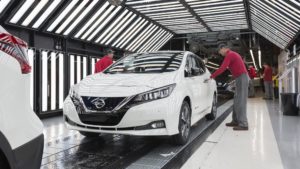
High energy costs and an eroding automotive supply chain in Britain are making Nissan Sunderland, the country’s largest car plant, uncompetitive, the carmaker has admitted.
Speaking at the formal unveiling of a reborn alliance between the Japanese company and its longstanding partner, Renault, the French carmaker, executives at Nissan said the Sunderland plant needed “government support”.
It came as the executives confirmed that an electric replacement for the old Micra model aimed at Nissan carbuyers in Europe would be built at Renault’s new ElectriCity manufacturing complex in northern France.
In London to unveil a simplified and equalised cross-shareholding between Renault and Nissan, Makoto Uchida, Nissan’s global chief executive, praised the Sunderland factory as a “very important and a core plant”, but added: “The UK is challenging and we need a supplier base.”
Ashwani Gupta, the chief operating officer, said the future of Nissan Sunderland depended on three issues: making it more attractive as an investment with the help of government support; a reduction in the cost of manufacturing against a backdrop of rising energy costs that are making it more expensive than peer factories on the Continent; and the localisation of a supply chain to reduce the cost of shipping components.
Asked whether Sunderland could regain its competitiveness as a car plant worth investing in, Gupta said: “That is a question that has to be answered.” Asked how it could regain its competitiveness, he said: “The support of government, because we do not have a big [automotive industry] in the UK.”
He declined to comment on what form that support should take, other than to say the government needed to “restore” the UK’s industrial base.
He admitted that the amount of domestic UK supply chain input into the plant had fallen to historic lows. “It is challenging to get to 40 per cent,” he said. Asked what would happen if Sunderland did not regain its competitiveness, he said: “Sunderland has to be competitive.”
In its pomp in 2016, the year Britons voted to secede from the European Union, the Sunderland factory, which has employed more than 7,000 people, was producing more than 500,000 cars a year. That has more than halved and last year only 238,000 cars rolled off its assembly lines. At present it produces the Qashqai, Britain’s bestselling car, Juke, a smaller version of that vehicle, and the all-electric Nissan Leaf.
The future of Nissan Sunderland is a moot point in the troubled marriage between the two carmakers. In 2015 — even before the toppling of Carlos Ghosn, creator of the Renault-Nissan alliance and its former chief executive, who is now a fugitive from Japanese authorities — relations between the companies were at breaking point, with Emmanuel Macron, a young and ambitious French economics minister, lobbying for Renault to take greater control of Nissan. Executives from Nissan briefed that part of Macron’s plan was to shut down Nissan Sunderland and to repatriate production to France to fill Renault’s under-utilised factories on the Continent.
Read more:
UK’s largest car plant focus of concern by Nissan as Sunderland factory branded uncompetitive

